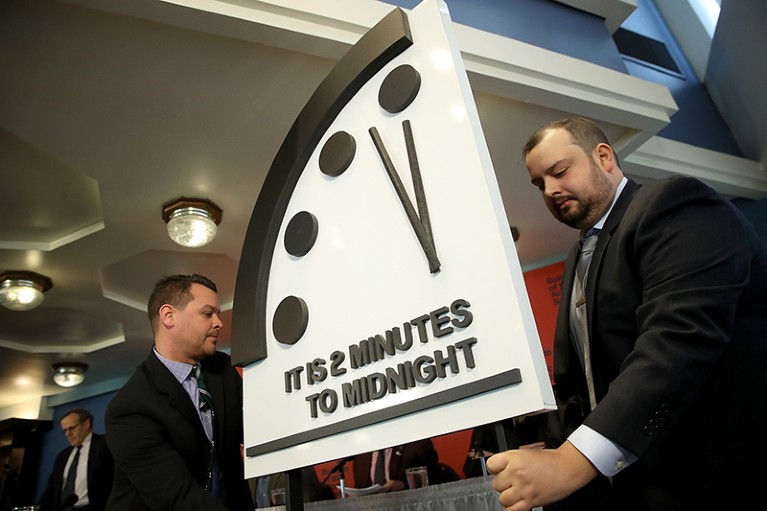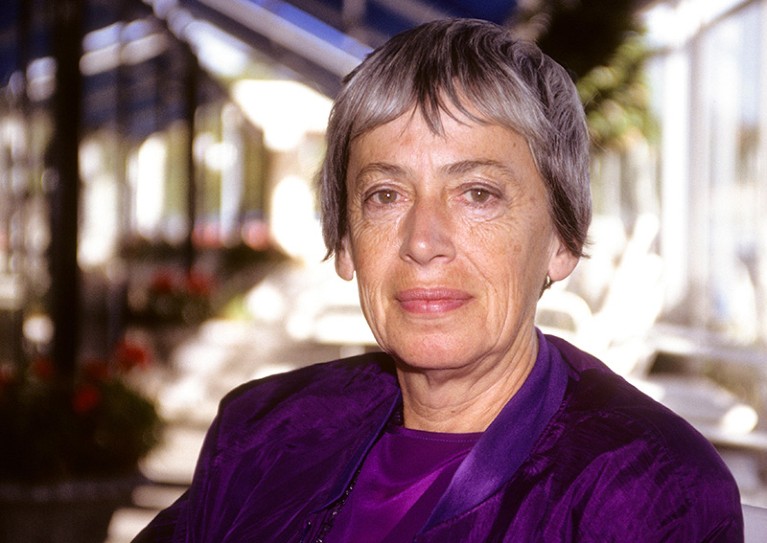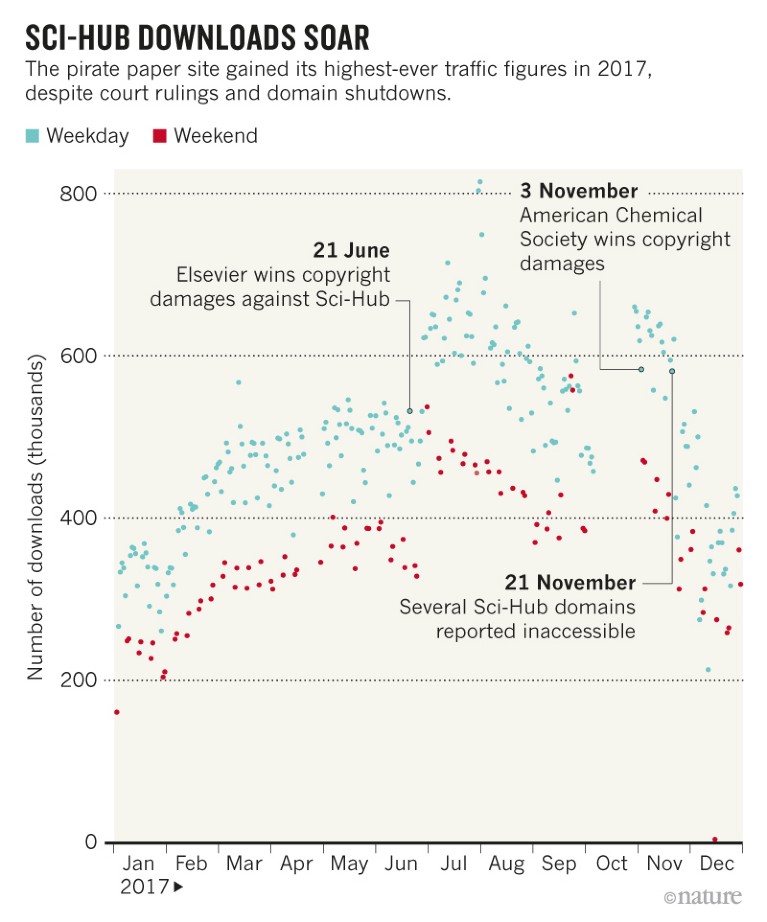EVENTS
Humanity edges closer to Doomsday The Bulletin of the Atomic Scientists advanced its symbolic Doomsday Clock on 25 January to two minutes until midnight. The only other time the clock — a symbolic measure of humanity’s risk of self-destruction — came so close to the apocalypse was at the height of the cold war, in 1953. This year’s decision to push the clock’s hands closer to midnight stems from growing nuclear threats and unchecked climate dangers, said Rachel Bronson, president and chief executive of the Bulletin, at a press conference in Washington DC to announce the move.

Credit: Win McNamee/Getty
Fraud finding Stem-cell scientist and Nobel-prizewinner Shinya Yamanaka will donate some of his salary to the research institute he leads after an investigation there found one of its scientists guilty of fraud. Investigators at Kyoto University in Japan announced on 22 January that Kohei Yamamizu, a researcher at the institution’s Center for iPS Cell Research and Application (CiRA), had acted alone in falsifying data in 11 out of 12 figures in a 2017 paper in Stem Cell Reports (K. Yamamizu et al. Stem Cell Rep. 8, 634–647; 2017). The experiments described in the article purported to show that induced pluripotent stem (iPS) cells could be used to model the blood–brain barrier in humans, but the investigators found that the main conclusions were based on fraudulent data. A retraction has been requested. Yamanaka said that the institute would now re-evaluate its anti-fraud measures. CiRA said that Yamanaka, who was not an author of the research paper, will donate his salary to compensate for the time he will spend working on extra fraud-prevention measures, rather than research. Yamamizu did not respond to a request for comment from Nature.
Indian protest More than 3,000 people signed an online petition rejecting comments made by a Indian higher-education minister who questioned the validity of the theory of evolution. On 20 January, Satyapal Singh told reporters at a conference on ancient Hindu texts that Charles Darwin’s theory of the evolution of humans “is scientifically wrong”. Singh’s comments outraged researchers, who quickly launched an online petition asking the minister to retract his claims. On 23 January, Singh’s boss Prakash Javadekar, the senior minister for human-resource development, dismissed the comments and said his ministry would not support anti-Darwinism activities, such as Singh’s proposal to change educational curricula.
SPACE
Challenge cancelled The Google Lunar XPRIZE’s US$30-million purse will go unclaimed, the XPRIZE Foundation announced on 23 January. Intended to reward the first private team to land a rover on the Moon, the prize has had its deadline pushed back multiple times since it was first announced in 2007. Five teams were racing to meet a 31 March cut-off, but they were stymied by “fundraising, technical and regulatory challenges”, the foundation said in a statement. Some of the teams have stated that they will continue their activities with outside funding. The challenge might continue with a new sponsor or with no cash reward, the foundation said.
Falcon Heavy test Private spaceflight company SpaceX tested all 27 of the engines on its Falcon Heavy rocket at Cape Canaveral, Florida, on 24 January. The roughly ten-second test sent enormous clouds of steam billowing above the rocket, punctuated by the popping roar of dozens of engines. The Falcon Heavy has three boosters — a step up from the company’s workhorse, Falcon 9, which has only one. SpaceX of Hawthorne, California, hopes to launch the Falcon Heavy on a maiden flight in the coming weeks, carrying founder Elon Musk’s red Tesla sports car. Eventually, the company wants to use the monster rocket to send astronauts to deep space.
PENSIONS
Strike threat Academics at 61 British universities are preparing to strike over possible changes to their pensions. In November 2017, after a pension scheme was revealed to have a deficit of £12.6 billion (US$17.7 billion), universities proposed transferring about 190,000 faculty members and other staff from pension policies that guarantee a retirement income to ones that make income dependent on investment return. Talks between employers and the University and College Union (UCU) in London, which represents tens of thousands of academics nationwide, ended without agreement on 23 January. In a previous ballot of UCU members, 88% supported strike action, which is set to start on 22 February. The board for the pension plan, known as the University Superannuation Scheme, must make a final decision on proposals by the end of June.
DRUGS
Antibiotic gap Only 2 of 28 antibiotics in clinical trials against ‘high-priority’ pathogens are accompanied by plans to prevent unnecessary use that can breed antimicrobial resistance, the Access to Medicine Foundation said in a report on 23 January. The non-profit organization in Amsterdam ranked how well 30 companies are doing in developing new antibiotics to fight pathogens that have become harder to treat, while ensuring that the drugs remain affordable and available where they are needed. The London-based drug company GlaxoSmithKline had the most products against priority pathogens in development, as well as plans to curb misuse.
PEOPLE
Salk switch Neuroscientist Rusty Gage has been appointed interim president of the Salk Institute in La Jolla, California, the institute said on 22 January. Gage’s appointment comes after the resignation of Nobel-prizewinning molecular biologist Elizabeth Blackburn on 21 December; she is now the institute’s president emerita. The Salk faces three lawsuits filed last year alleging that systemic gender discrimination there resulted in lower pay and fewer promotions for female scientists.
Noted author dies Acclaimed US science-fiction and fantasy writer Ursula K. Le Guin died on 22 January, aged 88. Le Guin was the daughter of two anthropologists, and often incorporated race and gender issues, as well as social-science themes, into her narratives. In her fictional futures — such as the Hainish universe, in which humans have spread to and evolved differently on a number of planets — Le Guin was known for exploring social interactions more than the technological advances typical of science fiction. Le Guin’s Earthsea fantasy series, written over four decades, featured a young wizard apprentice and is often described as a precursor of J. K. Rowling’s Harry Potter books.

Ursula K. Le Guin.Credit: Roger Tillberg/Alamy
ENVIRONMENT
EPA lawsuit A science-advocacy group and an academic researcher have jointly sued the US Environmental Protection Agency (EPA) to block a rule preventing scientists with active agency grants from serving on EPA advisory committees. The Union of Concerned Scientists in Cambridge, Massachusetts, and Lianne Sheppard, a biostatistician at the University of Washington in Seattle, filed suit in federal court on 23 January. Sheppard had to step aside from an EPA grant to remain on the agency’s clean-air advisory committee. When EPA administrator Scott Pruitt introduced the rule last October, he said it would prevent conflicts of interest; the lawsuit says that it will give private industry disproportionate influence.
Science nominee Former astronaut James Reilly is US President Donald Trump’s pick to lead the US Geological Survey, the White House said on 26 January. Reilly, who holds a PhD in geoscience, is a technical adviser for the US Air Force’s National Security Space Institute. During his career at NASA, from 1994 to 2008, he logged 853 hours in space and went on five spacewalks. Before joining the agency, he worked as an oil and gas exploration geologist. If confirmed by the Senate, Reilly would be the second person with a science PhD to be nominated by Trump to lead a major science agency.
French agency head
The French government appointed computer scientist Antoine Petit as president of its main basic-science agency, the CNRS, on 24 January. Petit had taken over from interim CNRS chief Anne Peyroche ahead of schedule, because she was “prevented” from continuing in the post, the ministry for higher education, research and innovation said on 18 January. Peyroche’s employer, the French Alternative Energies and Atomic Energy Commission, has launched an investigation into the results of some research papers that she co-wrote. A CNRS official told Nature that Peyroche is not responding to media enquiries. Petit, who was previously head of INRIA, France’s computer-science agency, says that he has three priorities for the CNRS: “to develop basic research, multidisciplinarity and France’s influence worldwide.”
FUNDING
Bulgarian budget European science ministers are due to meet in Sofia, Bulgaria, on 2 February to discuss future European Union research policy. The nation, which took over the rotating EU presidency last month, had said that it plans to invest in science to boost prosperity. But its national science funding is in disarray after the EU blocked €150 million (US$186 million) of an expected €700 million in funding for research and innovation facilities in Bulgaria because the country failed to identify enough qualified scientists to satisfy the EU’s demands. The Bulgarian government had cut its national science spending by around 25% in anticipation of the windfall.
TREND WATCH
Users of Sci-Hub downloaded more than 150 million papers in 2017, reveal raw data released by the pirate site. The data cover 329 days in 2017 and show that the site’s popularity is growing, despite court rulings and efforts to restrict access. An earlier data release covering 6 months in 2015–16 showed around 150,000–200,000 daily downloads, compared with around 460,000 each day last year, according to an analysis by data scientist Bastian Greshake Tzovaras at Lawrence Berkeley National Laboratory in California.

Source: Sci-Hub/Bastian Greshake Tzovaras, Lawrence Berkeley National Laboratory






